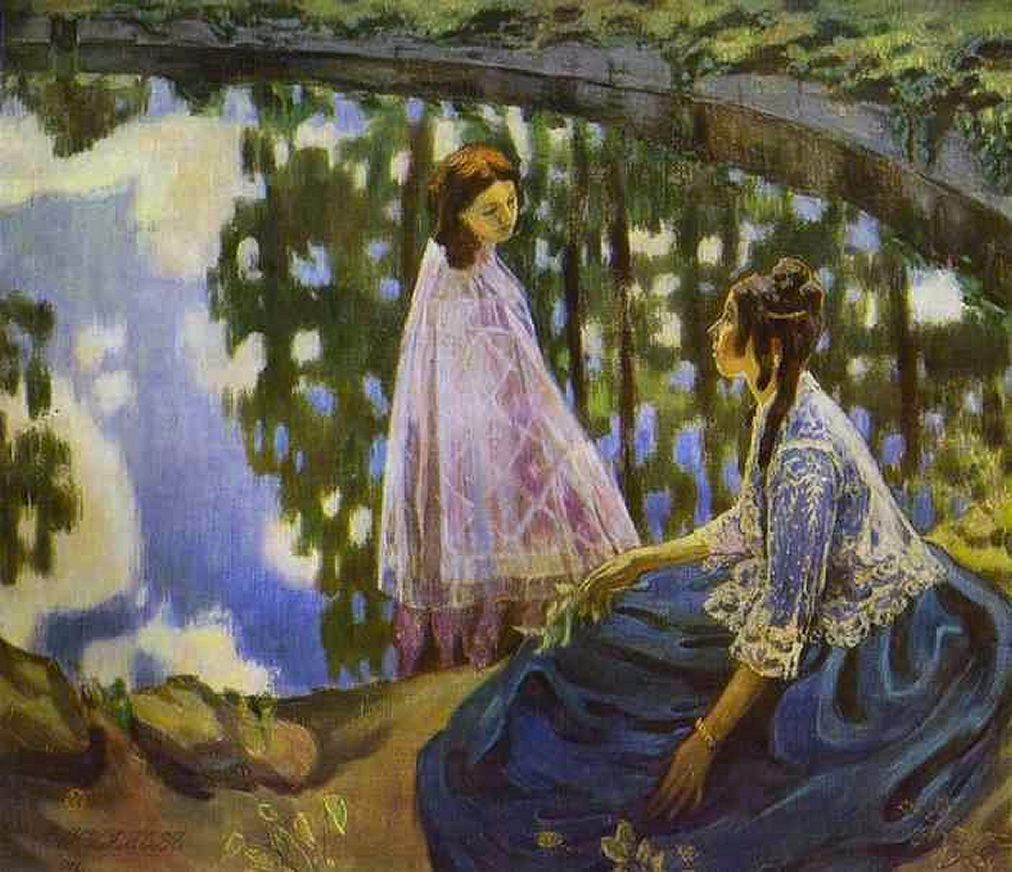Silentium is a well-known poem that
anticipated Symbolism.
Though Tiutchev professed to see his poetry
as a pastime, it has a distinctly pondered and metaphysical flavour, where nature is
a process, something that extracts order from chaos, as do the Greek
myths he sometimes incorporated, and the German philosophy he read.
Man's psyche, or 'soul' as he called it, is one of vague troubles,
inarticulate aspirations, dilemmas or even perversities. The psyche is
aroused at dubious hours and in abnormal states: in insomnias at night,
in dreams or over storm-ridden seas.

The nighttime sphere gradually emerged in his thinking as the primordial chaos in the myths of antiquity. In Silentum, the abyss of the ineffable is not the outer world but inside. {2-3}
SILENTIUM! *
Молчи, скрывайся и таи
И чувства и мечты свои -
Пускай в душевной глубине
Встают и заходят оне
Безмолвно, как звезды в ночи,-
Любуйся ими - и молчи.
Как сердцу высказать себя?
Другому как понять тебя?
Поймёт ли он, чем ты живёшь?
Мысль изречённая есть ложь.
Взрывая, возмутишь ключи,-
Питайся ими - и молчи.
Лишь жить в себе самом умей -
Есть целый мир в душе твоей
Таинственно-волшебных дум;
Их оглушит наружный шум,
Дневные разгонят лучи,-
Внимай их пенью - и молчи!.. {1}
* Latin for Silence
The piece is written in iambic tetrameters,
generally rhymed aabccb, though lines 4 and 5 end in feminine rhymes
and are a little irregular. Strictly, they should be scanned as:
Вста ют и (stressed word
missing) за хо дят о не 4B
Без молв но, (stressed
word missing) как звез ды в но чи,- 4C
but perhaps can be read as:
Вста ют и за хо дят о не 4b
Без молв но, как звез ды в но чи,- 4c
Otherwise, the poem is regular:
Мол чи, скры вайс я и та и 4a
И чувст ва и меч ты сво и - 4a
Пус кай в ду шев ной глу би не 4b
Вста ют и за хо дят о не 4B
Без молв но, как звез ды в но чи,- 4C
Лю буйс я и ми - и мол чи. 4c
Как сер дцу выс ка зать се бя? 4d
Дру го му как по нять те бя? 4d
Пой мёт ли он, чем ты жи вёшь? 4e
Мысль из ре чён на я есть
ложь. 4e
Взры ва я, воз му тишь клю чи,- 4f
Пи тай ся и ми - и мол чи. 4f
Лишь жить в се бе са мом у мей - 4g
Есть це лый мир в ду ше тво ей 4g
Та инст вен но-вол шеб
ных дум; 4h
Их ог лу шит на руж ный шум, 4h
Днев ны е раз гон ят лу чи,- 4i
Вни май их пен ью - и мол чи!.. 4i
A TTS (text to speech) recording is:
The nature poems reflect a spontaneous love for the earth, which is expressed in direct statements. Many poems express no more than moods and aimless meditations, often at the turning points of the seasons: spring brings elation, joy and promise, the autumn brings melancholia and reflection. The style throughout is elevated -- solemn and rhetorical in the earlier pieces, with some eighteenth-century relish for pointed comment, but later less formal. All the work was musical, and much is to a consistently high standard, though of course reactionary to liberal opinion in the late pro-Slavic poetry. 'Silentum' anticipated Symbolism. {2-3}
As in the Autumn Evening, Tiutchev's musicality is what we have to aim for:
Silentium
Be silent, hide yourself, conceal
the things you dream of, things you feel:
Let it be the depths of soul
that you arise from, still and whole.
Like stars at night that stay unheard,
in awe reflect without a word!
The flowering heart is not divined
so can some other know your mind?
Or say what you are living by
when words once spoken are a lie?
The water’s clouded when it’s stirred,
so drink the spring without a word:
So live within your self’s control:
a world is centered in your soul:
a world of strange enchanted thoughts
that noisy flare outside distorts.
By daytime's rays be undeterred,
take in those songs without a word
The Pool by Borisov Musatov 1902 (177cm x 216cm) Tempora. Tretyakov Gallery, Moscow {1} Musatov (1870-1905) was born in Saratov, Russia. A childhood injury made him a humpbacked, and his health was never good anyway. He was also plagued with money troubles till the last years of his life, when his work began to sell. Borisov-Musatov returned to Russia in 1898 and was almost immediately overcome by its 'fin de siècle' world-weariness, from which he escaped into a half-illusory world of the 19th century nobility, their parks and country-seats. {2-3}
References can now be found in a free pdf compilation of
Ocaso Press's Russian pages.
Russian poem translations on this site: listing.